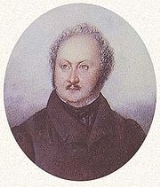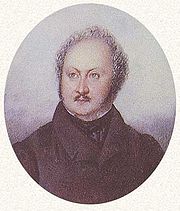
Karl Wilhelm Naundorff
Encyclopedia

Germany
Germany , officially the Federal Republic of Germany , is a federal parliamentary republic in Europe. The country consists of 16 states while the capital and largest city is Berlin. Germany covers an area of 357,021 km2 and has a largely temperate seasonal climate...
clock- and watch-maker who until his death claimed to be Prince Louis-Charles
Louis XVII of France
Louis XVII , from birth to 1789 known as Louis-Charles, Duke of Normandy; then from 1789 to 1791 as Louis-Charles, Dauphin of France; and from 1791 to 1793 as Louis-Charles, Prince Royal of France, was the son of King Louis XVI of France and Queen Marie Antoinette...
. Naundorff was one of the more stubborn of more than thirty men who claimed to be Louis XVII.
Biography
Prince Louis-Charles, the son of Louis XVI of FranceLouis XVI of France
Louis XVI was a Bourbon monarch who ruled as King of France and Navarre until 1791, and then as King of the French from 1791 to 1792, before being executed in 1793....
and Marie Antoinette
Marie Antoinette
Marie Antoinette ; 2 November 1755 – 16 October 1793) was an Archduchess of Austria and the Queen of France and of Navarre. She was the fifteenth and penultimate child of Holy Roman Empress Maria Theresa and Holy Roman Emperor Francis I....
, was imprisoned during the French Revolution
French Revolution
The French Revolution , sometimes distinguished as the 'Great French Revolution' , was a period of radical social and political upheaval in France and Europe. The absolute monarchy that had ruled France for centuries collapsed in three years...
and believed to have died in prison. However, there were various rumors that monarchist sympathizers had spirited the young dauphin away from the Temple prison
Temple (Paris)
The Temple was a medieval fortress in Paris, located in what is now the IIIe arrondissement. It was built by the Knights Templar from the 12th century, as their European headquarters. In the 13th century it replaced earlier works of the Vieille Temple in Le Marais...
and that he was living elsewhere in secret.
The first records of Karl Wilhelm Naundorff are from 1810 in Spandau
Spandau
Spandau is the fifth of the twelve boroughs of Berlin. It is the fourth largest and westernmost borough, situated at the confluence of the Havel and Spree rivers and along the western bank of the Havel, but the least populated.-Overview:...
, Berlin
Berlin
Berlin is the capital city of Germany and is one of the 16 states of Germany. With a population of 3.45 million people, Berlin is Germany's largest city. It is the second most populous city proper and the seventh most populous urban area in the European Union...
, where he received the citizenship of Prussia
Prussia
Prussia was a German kingdom and historic state originating out of the Duchy of Prussia and the Margraviate of Brandenburg. For centuries, the House of Hohenzollern ruled Prussia, successfully expanding its size by way of an unusually well-organized and effective army. Prussia shaped the history...
. By 1822 he had moved to live with a family in Brandenburg-on-the-Havel
Brandenburg (town)
Brandenburg an der Havel is a town in the state of Brandenburg, Germany, with a population of 71,778 . It is located on the banks of the River Havel. The town of Brandenburg, which is almost as widely known as the state of Brandenburg, provided the name for the medieval Bishopric of Brandenburg,...
where he was later accused of arson
Arson
Arson is the crime of intentionally or maliciously setting fire to structures or wildland areas. It may be distinguished from other causes such as spontaneous combustion and natural wildfires...
and 1824 was jailed for three years for counterfeiting.
Impersonation
When he was released in 1827, he moved to CrossenCrossen
Crossen may refer to:* Crossen an der Elster, municipality in Thuringia, Germany* Zwickau-Crossen, part of Zwickau in Saxony, Germany* Crossen , German name of Krosno Odrzańskie, Poland* part of the municipality Erlau in Saxony, Germany...
and wrote the first of two books of would-be-memoirs. The second he wrote in England many years later and was translated to English by Charles G. Perceval, Rector of Calverton, Buckinghamshire, and nephew of Spencer Perceval
Spencer Perceval
Spencer Perceval, KC was a British statesman and First Lord of the Treasury, making him de facto Prime Minister. He is the only British Prime Minister to have been assassinated...
. He claimed that he had been substituted with a deaf and mute orphan who died soon afterward and that he had been hidden in a secret area of the Tower of the Temple until his escape. He also claimed that he was later recaptured by Napoleon's forces and secretly kept in several dungeons throughout Europe until finally escaping in his mid-twenties. He could present no proof of any of this.
In 1833, Naundorff travelled to Paris where another claimant to the French throne, the Duke of Richemont, was on trial. One of the witnesses for the prosecution read out his letter as a counterclaim.
Despite the fact that Naundorff did not speak French very well, he managed to convince various former members of the Louis XVI's court that he was the Dauphin. He seemed to know everything about the private life of the royal court, gave right answers to most questions and spoke to courtiers as if he had known them as a child. One of them was Agathe de Rambaud
Agathe de Rambaud
Agathe de Rambaud was born in Versailles as Agathe-Rosalie Mottet and was baptized in the future cathedral Saint-Louis of Versailles, on December 10, 1764. She died in Aramon, in the département of Gard, on October 19, 1853...
, Louis' childhood nurse who accepted him. Others who claimed to have recognized him as the prince include Étienne de Joly, King Louis XVI's Minister of Justice, and Jean Bremond, the king's personal secretary.
However, Princess Marie-Thérèse, the sister of Prince Louis, did not acknowledge him. She had seen pictures of him, claimed she did not see any resemblance to her brother and refused even to see him despite having seen other claimants who were not represented by former members of the royal court. On one occasion Agathe de Rambaud travelled to Prague
Prague
Prague is the capital and largest city of the Czech Republic. Situated in the north-west of the country on the Vltava river, the city is home to about 1.3 million people, while its metropolitan area is estimated to have a population of over 2.3 million...
by carriage to persuade her but to no avail as the princess refused to see her as well.
In 1836, Naundorff sued Marie Thérèse for property that supposedly belonged to him. Instead, the police force of king Louis-Philippe
Louis-Philippe of France
Louis Philippe I was King of the French from 1830 to 1848 in what was known as the July Monarchy. His father was a duke who supported the French Revolution but was nevertheless guillotined. Louis Philippe fled France as a young man and spent 21 years in exile, including considerable time in the...
arrested him, seized all his papers and deported him to England
England
England is a country that is part of the United Kingdom. It shares land borders with Scotland to the north and Wales to the west; the Irish Sea is to the north west, the Celtic Sea to the south west, with the North Sea to the east and the English Channel to the south separating it from continental...
. There he worked to develop several military inventions, including an early grenade, and a recoilless rifle which he eventually sold to the Dutch Military. He declared that he would be restored to the throne on January 1, 1840. When that date passed, he lost the majority of his supporters.
Legacy and continued controversy
Naundorff died on August 10, 1845 in DelftDelft
Delft is a city and municipality in the province of South Holland , the Netherlands. It is located between Rotterdam and The Hague....
, the Netherlands, possibly of poisoning. He had been living there with his family after being made Director of Pyrotechnics for the Dutch Military. He still had some supporters because the epitaph on his grave reads "Here lies Louis XVII, King of France" and in his death certificate he is named as "Charles-Louis de Bourbon, Duke of Normandy (Louis XVII), who was known under the name of Charles-Guillaume Naundorff, [...] son of His Majesty the late Louis XVI, King of France and of Her Imperial and Royal Highness Marie Antoinette, Archduchess of Austria, Queen of France, who both died in Paris". France has insisted this document be set aside but the Netherlands has refused.
Naundorff's descendants did not give up. Some of them insisted on using the surname "de Bourbon" and they petitioned for recognition to French courts and senates all through the 19th and 20th centuries. Circus director René Charles "de Bourbon," an illegitimate son of one of Naundorff's grandchildren, lost his claim in a French court in 1954. However, some of the descendants still press the claim.
A handful of French historians insist that DNA
DNA
Deoxyribonucleic acid is a nucleic acid that contains the genetic instructions used in the development and functioning of all known living organisms . The DNA segments that carry this genetic information are called genes, but other DNA sequences have structural purposes, or are involved in...
testing finally resolved the issue of Naundorff's claim —mitochondrial DNA
Mitochondrial DNA
Mitochondrial DNA is the DNA located in organelles called mitochondria, structures within eukaryotic cells that convert the chemical energy from food into a form that cells can use, adenosine triphosphate...
sequences of remains that researchers have claimed to have belonged to Naundorff were compared with sequences obtained from the remains of Marie-Antoinette and two of her sisters, as well as two living maternal relatives. They argue that differences in the nucleotide
Nucleotide
Nucleotides are molecules that, when joined together, make up the structural units of RNA and DNA. In addition, nucleotides participate in cellular signaling , and are incorporated into important cofactors of enzymatic reactions...
sequences make it very unlikely that Naundorff was the son of Marie-Antoinette. A group of his descendants disagree that the remains are those of Naundorff and are independently continuing the investigation.

